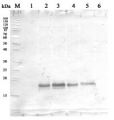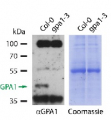1

Anti-GPA1 | Guanine nucleotide-binding protein subunit alpha 1 (affinity purified)
AS12 2370 | Clonality: Polyclonal | Host: Rabbit | Reactivity: Arabidopsis thaliana
- Product Info
-
Immunogen: KLH-conjugated synthetic peptide derived from Arabidopsis thaliana GPA1, UniProt: P18064, TAIR: AT2G26300
Host: Rabbit Clonality: Polyclonal Purity: Immunogen affinity purified serum in PBS pH 7.4. Format: Lyophilized Quantity: 50 µg Reconstitution: For reconstitution add 50 µl of sterile water Storage: Store lyophilized/reconstituted at -20°C; once reconstituted make aliquots to avoid repeated freeze-thaw cycles. Please remember to spin the tubes briefly prior to opening them to avoid any losses that might occur from material adhering to the cap or sides of the tube. Tested applications: Western blot (WB) Recommended dilution: 1 : 4000 (WB) Expected | apparent MW: 49.3 kDa - Reactivity
-
Confirmed reactivity: Arabidopsis thaliana Predicted reactivity: Brassica napus, Capsicum annuum, Cynara cardunculus var. scolymus, Eschscholzia californica, Glycine max, Gossypium hirsutum, Hordeum vulgare, Lupinus luteus, Medicago truncatula, Morus notabilis, Nicotiana benthamiana, Nicotiana tabacum, Oryza sativa, Pisum sativum, Phaseolus vulgaris, Populus trichocarpa, Ricinus communis, Solanum lycopersicum, Solanum tuberosum, Sorghum bicolor, Spinacia oleracea, Theobroma cacao, Triticum aestivum, Zostera marina, Vitis vinifera
Species of your interest not listed? Contact usNot reactive in: No confirmed exceptions from predicted reactivity are currently known - Application Examples
-
Application example
25 µg of total protein from the indicated Arabidopsis thaliana wilde type and gpa1-3 mutant were extracted with extraction buffer ( 250 mM sucrose, 100 mM HEPES-KOH pH 7.5, 5% glycerol, 1mM Na2MoO4 x 2H2O, 25mM NaF, 10 mM EDTA, 1mM DTT, 0.5% Triton X-100, protease inhibitor cocktail) and denatured with SDS loading dye (50 mM Tris-HCl pH6.8, 100mM DTT, 2%SDS, 10% glycerol, 0.025% bromophenol blue) at 70°C for 2-5 min were separated on 10% SDS-PAGE and blotted 1h to PVDF using tank transfer. Blots were blocked with Tris-buffered saline containing 0.05% Tween-20 (TBS-T) and 5% skimmed milk powder for 1h at room temperature (RT) with agitation. Blot was incubated in the primary antibody (anti-GPA1, AS12 2370) at a dilution of 1: 5 000 overnight at 4°C with agitation. The antibody solution was decanted and the blot was rinsed briefly twice, then washed 5 times for 15 min in TBS-T with milk powder at RT with agitation. Blot was incubated in secondary antibody (Goat-Anti-Rabbit HRP conjugate, AS09 602) diluted 1:5000 for 2h at RT with agitation. The blot was washed as above with TBS-T without milk powder and then developed with Thermo Scientific SuperSignal West Substrate (pico and femto mixed 1:1), before exposure to a CEA RP NEW film for 10min.
Courtesy of Dr. Elena Petusching, Georg-August-University Goettingen, Germany

Immunodetection of GPA1 (alpha subunit of heterotrimeric G protein). Microsomes were affinity purified to isolate palmitoylated proteins using the acyl biotin exchange method1. Proteins were separated by SDS-PAGE and immunodetected with anti-GPA1. GPA1 is expected to be modified by S-acylation and was enriched in the affinity-purified fraction.
1. Wan, J., Roth, A. F., Bailey, A. O. & Davis, N. G. Palmitoylated proteins: purification and identification. Nat. Protoc. (2007). doi:10.1038/nprot.2007.225
Palmitoylated (S-acylated) proteins were affinity purified from Arabidopsis thaliana using the acyl biotin exchange method1 and separated using SDS-PAGE. Proteins were electro-transferred to PVDF membrane (Millipore, Cat. No. IVPH00010). The membrane was blocked with 5% non-fat dry milk (NFDM) in Tris-buffered saline (TBS) for two hours at room temperature. All incubations were performed with gentle agitation. The membrane was treated with primary antibody (anti-GPA1 [Agrisera, Cat. No. AS12 2370]; 1:7500 in TBS containing 5% NFDM and 0.05% Tween-20) for 2 hours. Blots were quickly rinsed twice with TBS containing 0.05% Tween (TBS-T), then washed five times for 15 minutes each with TBS-T on a shaker. The membrane was treated for 45 minutes with HRP-tagged secondary antibody (Agrisera, Cat. No. AS09 602) diluted 1:10 000 in TBS-T containing 5% non-fat dried milk. Blots were washed 2-3 times for 15 minutes with TBS-T, followed by two 15-minute washes with TBS. Immunolabeled proteins were detected with chemiluminescent detection reagent and imaged using X-ray film.
Courtesy of John McLarney under the guidance of Dr. Estelle Hrabak, University of New Hampshire, USA - Additional Information
-
Additional information: This product can be sold containing proclin if requested Additional information (application): The nature of a 37 kDa cross-reacting band is not known. - Background
-
Background: GPA1 (G PROTEIN ALPHA-1) is involved as a modulator or transducer in various transmembrane signaling systems. Together with GCR1, may regulate the cell cycle via a signaling cascade Promotes abscisic acid (ABA) responses in guard cells. But, together with GCR1 and GB1, acts as a negative regulator of ABA during seed germination and early seedling development. Involved in the blue light (BL) signaling. Alternative name: GP-alpha-1. - Protocols
-
Agrisera Western Blot protocol and video tutorials
Protocols to work with plant and algal protein extracts
Oxygenic photosynthesis poster by prof. Govindjee and Dr. Shevela
Z-scheme of photosynthetic electron transport by prof. Govindjee and Dr. Björn and Dr. Shevela - Reviews:
-
This product doesn't have any reviews.




